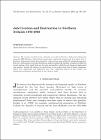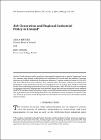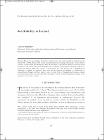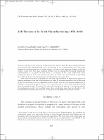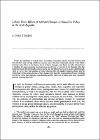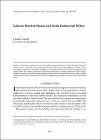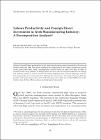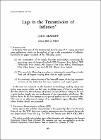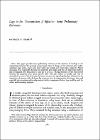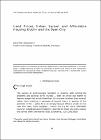Browsing Economic and Social Review by Title
Now showing items 426-445 of 920
-
Job creation and destruction in Northern Ireland: 1973-1993
(Economic & Social Studies, Dublin, 2004)Job creation and destruction estimates are made for Northern Ireland manufacturing using the ARD database. International comparisons suggest job creation and destruction rates in Northern Ireland were below those elsewhere. ... -
Job generation and regional industrial policy in Ireland
(Economic & Social Studies, Dublin, 2000)Irish industrial policy explicitly encouraged job generation in certain ?designated? areas via, amongst other things, preferential grant treatment, job targets and the building of advance factories in the IDA?s (Industrial ... -
Job mobility in Ireland
(Economic & Social Studies, Dublin, 2009)This paper investigates the factors that determine job-to-job mobility in Ireland over the period 1995 to 2001. It finds that labour market experience, working in the public sector, whether a person is overskilled, the ... -
Job turnover in Irish manufacturing 1972?2006
(Economic & Social Studies, Dublin, 2008)With the recent slowdown in global economic growth, there has been considerable focus in Ireland on some high-profile job losses, particularly in the manufacturing sector. This paper places such developments into a broader ... -
Kenneth H. Connell
(Economic & Social Studies, Dublin, 1974)Kenneth Connell died in Belfast in September 1973 at the age of 56. Within Ireland he was probably the best known Belfast scholar in the broad field of Irish Studies, and outside Ireland almost certainly the most widely ... -
Kinship, neighbourhood and social change in Irish rural communities
(Economic & Social Studies, DUBLIN, 1972)Rural communities in the West of Ireland, even in the most remote, and most traditional areas have experienced immense social organisational and cultural changes during the past twenty years. Indeed, in many respects, these ... -
Labor supply and commodity demands - an application to Irish data
(Economic & Social Studies, Dublin, 1987)Annual Irish data are used lo estimate a model which allows for the joint determination of commodity demands and labour supply. Consumer preferences are modelled by a cost function of the Gorman polar form which permits ... -
Labor-force effects of 1967-68 changes in education policy in Irish republic
(Economic & Social Studies, Dublin, 1976)In 1968 the so-called 'free' secondary education scheme was introduced, and mintermediate and leaving certificate courses were added in vocational schools. This article examines the effect on the labour force of these ... -
Labour and irish political party system - a suggested approach to analysis
(Economic & Social Studies, DUBLIN, 1970)In the politics of the Irish state only three parties have been able to maintain substantial electoral support for more than a decade. Two - Fianna Fail and Fine Gael - stem from the same Sinn Fein party which in the years ... -
Labour and the Irish party system revisited - party competition in the 1920s
(Economic & Social Studies, Dublin, 1977)In the 1969 General Election the Labour Party received more votes than at any other time in its electoral history. Nevertheless, despite this success, Labour continues to be one of the smallest social democratic parties ... -
Labour force participation and the growth of women's employment, Ireland 1971-1991
(Economic & Social Studies, Dublin, 1993)This paper studies changes in labour force participation rates and in the structure of the Irish labour force over the period 1971-1991. The rise in participation rates among females aged 25-54 and the decline among older ... -
Labour market rents and Irish industrial policy
(Economic & Social Studies, Dublin, 1999)This paper examines the issue of whether harmonising taxes across the traded and nontraded sectors is desirable. Preferential treatment for the traded sector might be justified if either the output response of subsidies ... -
Labour market rigidities, institutional impediments and managerial constraints: Some reflections on the recent experience of macro-political bargaining in Ireland
(Economic & Social Studies, Dublin, 1996)It has become almost an accepted axiom within contemporary political science that macro-political forms of bargaining are in irreversible decline. Such institutionalised forms of bargaining are now perceived as inflexible ... -
Labour productivity and foreign direct investment in Irish manufacturing industry: a decomposition analysis
(Economic & Social Studies, Dublin, 2005)Overall labour productivity in the Irish manufacturing sector increased by 158 per cent between 1991 and 1999. This paper examines the components of this labour productivity growth in the period 1991-1999, using a decomposition ... -
Lags in transmission of inflation
(Economic & Social Studies, Dublin, 1977)In the July 1976 issue of The Economic and Social Review, P. T. Geary presented some preliminary results on the analysis of lags in the transmission of inflation. Essentially his paper consisted of the following points. ... -
Lags in transmission of inflation - some preliminary estimates
(Economic & Social Studies, Dublin, 1976)This paper provides some preliminary estimates of the structure of the lags in the relationships between the quarterly proportionate rates of change of the consumer price index, wholesale price index, export unit value ... -
Land prices, urban sprawl and affordable housing: Dublin and the open city
(Economic & Social Studies, Dublin, 2001)Dublin?s current boom shares many features with urban booms elsewhere. In this short paper, I suggest applying an open city framework to Dublin and looking at this framework?s implications for two policies closely related ... -
Language and occupational status: linguistic elitism in the Irish labour market
(Economic & Social Studies, Dublin, 2009)This paper, using data from the 2006 Irish Census, provides evidence of the structural advantage of Irish speaking, relative to non-speaking workers in Ireland?s labour market with advantage and disadvantage being defined ... -
Leontief paradox and United Kingdom patterns of trade in manufactures
(Economic & Social Studies, Dublin, 1975)The Heckscher-Ohlin model is concerned mainly with the causes and structure of international trade. According to this model trade arises because countries possess factors of production in different proportions. This leads ... -
Liberalization and capital flight
(Economic & Social Studies, Dublin, 1988)A two-period trade theoretic model is used to analyse the effects of liberalisation programmes in a financially repressed economy (where official bank loan and deposit rates are artificially low). Financial repression ...




